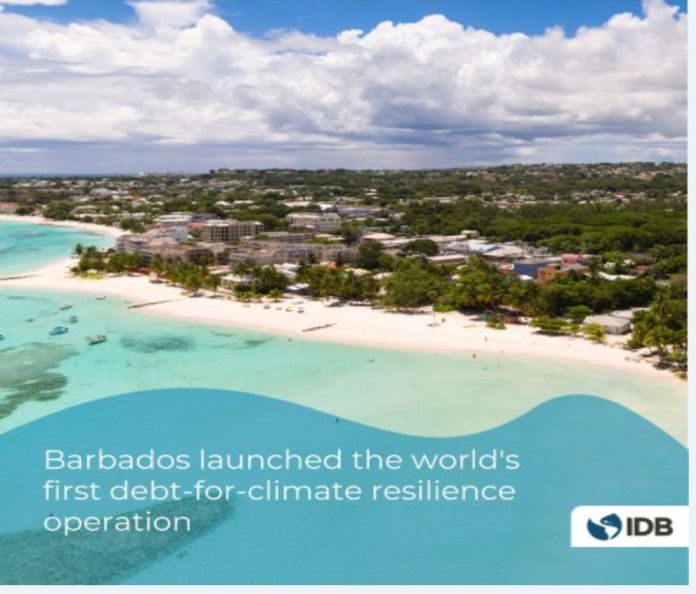- The deal generated US$125 million in fiscal savings which will be channeled into new resilience investments. The debt conversion represents innovative financing model for climate adaptation that avoids increasing the burden of public debt.
BRIDGETOWN, Barbados, (IDB) – Barbados has successfully completed an unprecedented debt-for climate operation to finance water and sewage projects resilient to climate change. Through support from its international funding partners, Barbados replaced outstanding, more expensive debt with more affordable financing, generating US$125 million in fiscal savings which will be used to enhance water resource management and increase water and food security.
CIBC Caribbean, as lead arranger, successfully closed the Sustainability Linked Loan transaction last week. The loan was backed by US$300 million in guarantees – US$150 million each from the Inter-American Development Bank (IDB) and the European Investment Bank (EIB), the latter under the European Union’s Global Gateway Initiative. With the support of the guarantees, Barbados secured a long-tenor, local currency loan at favorable conditions arranged by CIBC Caribbean, with regional banks investing in the transaction.
The debt conversion will create the necessary fiscal space to finance upgrading the South Coast sewage treatment plant into a modern water reclamation facility plus several associated facilities. The water reclamation facility, one of the first in the Caribbean, will produce water with a suitable quality for use in agricultural irrigation and groundwater recharge.
The additional fiscal space also allows for investments to reduce water losses and improve the sewer system. The reduction in marine and groundwater pollution will help protect marine ecosystems and nearshore reefs, groundwater quality and safeguard public health. The IDB and the Green Climate Fund (GCF) are providing a total of US$110 million upfront funding for the project, including a US$40 million grant from the GCF.
Prime Minister Mia Mottley, said: “In the face of the climate crisis, this groundbreaking transaction serves as a model for vulnerable states, delivering rapid adaptation benefits for Barbados. With upfront funding from our partners, we are building a state-of-the-art facility to boost water management, food security, and resilience -showcasing how innovation and cooperation drive environmental and fiscal gains.”
IDB president Ilan Goldfajn, advised: “This is an important milestone in several dimensions. It is the first debt-for-climate operation focused on climate resilience, paired with a groundbreaking financial innovation with unprecedent partnerships,” said IDB president Ilan Goldfajn. “I will have the opportunity to be in Barbados in a few days to do a deep dive on this operation and related project and see how we can replicate this model in other instances. This is impact at scale with innovation and partnership at work.”
EIB president Nadia Calviño, stated: “The European Investment Bank is providing innovative financing solutions to support those most vulnerable to climate change, alongside our partners, the Inter-American Development Bank, the Green Climate Fund and the European Commission,” said EIB Group president Nadia Calviño. “As the climate bank, we are proud to be part of the first debt-for-climate resilience conversion, which will support vital investments in Barbados and could give us an important model for other such operations in the future.”
CIBC Caribbean’s chief executive officer, Mark St Hill, noted:
“Barbados’ initiative enhances climate resilience and sets a benchmark for sustainable adaptation for the Caribbean. CIBC Caribbean is honoured to again collaborate with the government of Barbados and multilateral agencies like the IDB and EIB in setting precedents for innovative financial mechanisms that drive environmental stewardship in our region. This partnership underscores our commitment to accelerating climate action and fostering sustainable development across the Caribbean.”
GCF executive director, Mafalda Duarte, said: “Debt-for-climate conversions can support responses to two overlapping crises: constraining debt and the escalating climate emergency. The Green Climate Fund is a proud partner of Barbados in bringing a coalition of financiers together, all backing an innovative financial instrument aimed at helping the island nation achieve its development and climate goals.”
Barbados, one of the world’s most water-scarce countries, faces an average per capita water availability four times less than the global average – a challenge set to worsen with climate change. It also faces a large annual food import bill, as farmers lack water to expand crop production.
The debt-for-climate conversion has been structured as a Sovereign Sustainability-Linked Loan (SSLL), marking the first SSLL tied to a sovereign water security project. The sustainability targets underpinning the loan relate to the volume and quality of reclaimed water generated by the upgraded plant. If the targets are not met, the government incurs a financial penalty, which will be paid into a specialized trust for environmental investments, the Barbados Environmental Sustainability Fund.
IDB and CIBC Caribbean acted as Sustainability Structuring Agents with the support of CIBC’s Global Sustainable Finance Team. Sustainalytics, a leading provider of second-party opinions for sustainability-linked financial instruments, reviewed Barbados’ Climate Resilience Sovereign Sustainability-Linked Financing Framework to which the SSLL is aligned. They found that the Framework aligns with international best practices, assessing the Key Performance Indicator (KPI) as “strong” and the Sustainability Performance Target (SPT) as “highly ambitious.”
The transaction will help Barbados advance its resilience plans outlined in the country’s Updated Nationally Determined Contribution (NDC) and its Investment Plan for Prosperity and Resilience, in alignment with the Paris Agreement and the country’s Roofs to Reefs Program, by enhancing climate resilience through increasing water availability and food security and preventing marine pollution.

